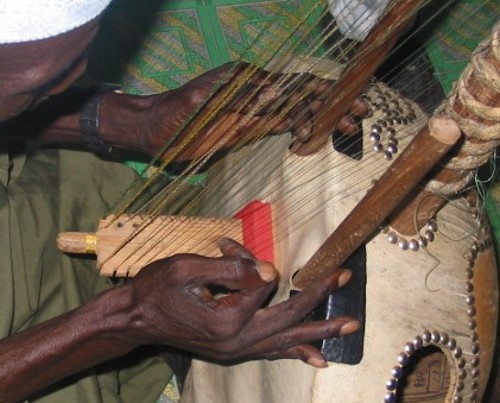Kora - the instrument
 Brikama, Gambia |
The Kora is a Westafrican harp of the family of bridge harps or harp-lutes.
It's the highest developped string instrument of Africa. The construction of the instrument as well as the music are unique in the world. |
 Ziguinchor, Casamance, Senegal |
The Kora is found in all Mande cultures.
It is played by the Mandinka in Gambia, Senegal and Guinea Bissau, the Malinke or Maninka in Guinée, the Bambara or Bamana in Mali and the Dioula in Côte d'Ivoire (Ivory Coast). Though, it's Gambia and Casamance (South Senegal) where it has the greatest importance for social life. The Kora has a centuries-old tradition and has been played at royal courts, where the musicians and griots belonged to the personnel. The Kora was mentioned 1799 for the first time in literature by Mungo Park (Scotland) in Travels in the interior districts of West Africa as korri. |
 Cap Skirring, Casamance, Senegal |
The Kora has a big hemispherical body, a long neck
and two planes with left 11 and right 10 strings running in notches at the sides of an upright mounted bridge. |
 Ziguinchor, Casamance, Senegal |
The playing style resembles the finger picking blues guitar,
the placement of the strings allows for the playing of chords and harmonies and fast melodic runs. |
 inventory at Keur Moussa, Monastery 50km Dakar, Senegal |
for a "Kora à cles" guitar-style machine screws 1970
|
 Europe -> Bamako, Mali |
prices in Europe (i.e. www.korakaelig.fr) may vary from 500€ to more than 1500€ Kora
|
in Gambia, Casamance or Guinea Bissau you may get one for 100€ Kora or even less
try to get a Kora from a musician or instrument maker rather than from a shop,
as they can play it for you to hear if it sounds ok

Galissa Kunda, Gabú, Guinea Bissau